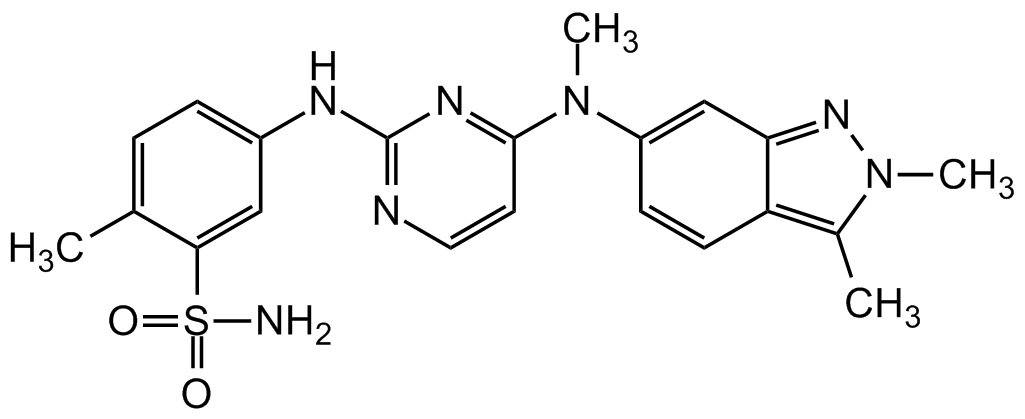Pazopanib (free base)
| Code | Size | Price |
|---|
| AG-CR1-3746-M010 | 10 mg | £35.00 |
Quantity:
| AG-CR1-3746-M050 | 50 mg | £80.00 |
Quantity:
| AG-CR1-3746-M250 | 250 mg | £185.00 |
Quantity:
Prices exclude any Taxes / VAT
Overview
Regulatory Status: RUO
Shipping:
AMBIENT
Storage:
Short Term: +4°C Long Term: -20°C
Images
Documents
Further Information
Alternate Names/Synonyms:
GW-786034; GW786034B; GSK-VEG10003; Votrient; Armala
Appearance:
White to off-white solid.
CAS:
444731-52-6
EClass:
32160000
Form (Short):
liquid
GHS Symbol:
GHS08
Handling Advice:
Keep cool and dry.
Hazards:
H373, H413
InChi:
InChI=1S/C21H23N7O2S/c1-13-5-6-15(11-19(13)31(22,29)30)24-21-23-10-9-20(25-21)27(3)16-7-8-17-14(2)28(4)26-18(17)12-16/h5-12H,1-4H3,(H2,22,29,30)(H,23,24,25)
InChiKey:
CUIHSIWYWATEQL-UHFFFAOYSA-N
Long Description:
Chemical. CAS: 444731-52-6. Formula: C21H23N7O2S. MW: 437.5. Pazopanib is a potent and selective multi-targeted receptor tyrosine kinase inhibitor. It is an orally available angiogenesis inhibitor targeting vascular endothelial growth factor receptor (VEGFR), platelet-derived growth factor receptor (PDGFR) and c-kit. It inhibits the VEGF receptors VEGFR1, VEGFR2, and VEGFR3 (IC50s = 10, 30, and 47 nM, respectively, in a cell-free enzyme assay) and also inhibits PDGFR, FGFR, c-Kit and c-fms with IC(50) values of 84nM, 74nM, 140nM and 146nM, respectively, all key proteins responsible for tumor growth and angiogenesis. Pazopanib is an anti-tumor and anti-angiogenic agent. It inhibits upregulation of the surface adhesion proteins ICAM-1 and VCAM-1 induced by VEGF in multiple myeloma cells co-cultured with human umbilical vein endothelial cells (HUVECs) and decreases multiple myeloma cell adhesion to HUVECs. It also inhibits proliferation of multiple myeloma cells co-cultured with HUVECs. Pazopanib reduces tumor growth, induces apoptosis, decreases angiogenesis and increases survival in vivo in multiple myeloma mouse xenograft model. Formulations containing pazopanib have been used in the treatment of cancer.
MDL:
MFCD11616589
Molecular Formula:
C21H23N7O2S
Molecular Weight:
437.5
Package Type:
Vial
Precautions:
P260, P273, P314
Product Description:
Pazopanib is a potent and selective multi-targeted receptor tyrosine kinase inhibitor. It is an orally available angiogenesis inhibitor targeting vascular endothelial growth factor receptor (VEGFR), platelet-derived growth factor receptor (PDGFR) and c-kit. It inhibits the VEGF receptors VEGFR1, VEGFR2 and VEGFR3 (IC50s = 10, 30 and 47 nM, respectively, in a cell-free enzyme assay) and also inhibits PDGFR, FGFR, c-Kit and c-fms with IC50 values of 84nM, 74nM, 140nM and 146nM, respectively, all key proteins responsible for tumor growth and angiogenesis. Pazopanib is an anti-tumor and anti-angiogenic agent. It inhibits upregulation of the surface adhesion proteins ICAM-1 and VCAM-1 induced by VEGF in multiple myeloma cells co-cultured with human umbilical vein endothelial cells (HUVECs) and decreases multiple myeloma cell adhesion to HUVECs. It also inhibits proliferation of multiple myeloma cells co-cultured with HUVECs. Pazopanib reduces tumor growth, induces apoptosis, decreases angiogenesis and increases survival in vivo in multiple myeloma mouse xenograft model. Formulations containing pazopanib have been used in the treatment of cancer.
Purity:
>98% (HPLC)
Signal word:
Warning
SMILES:
CC(C(S(=O)(N)=O)=C1)=CC=C1NC2=NC=CC(N(C)C3=CC4=NN(C)C(C)=C4C=C3)=N2
Solubility Chemicals:
Soluble in DMSO or DMF (both 10mg/ml). Insoluble in water.
Transportation:
Non-hazardous
UNSPSC Category:
Protein Kinase Modulators
UNSPSC Number:
12352200
Use & Stability:
Stable for at least 2 years after receipt when stored at -20°C.
References
The small-molecule VEGF receptor inhibitor pazopanib (GW786034B) targets both tumor and endothelial cells in multiple myeloma: K. Podar, et al.; PNAS 103, (2006) | Pharmacokinetic-pharmacodynamic correlation from mouse to human with pazopanib, a multikinase angiogenesis inhibitor with potent antitumor and antiangiogenic activity: R. Kumar, et al.; Mol. Cancer Ther. 6, 2012 (2007) | Pazopanib: a novel multitargeted tyrosine kinase inhibitor: G. Sonpavde & T.E. Hutson; Curr. Oncol. Rep. 9, 115 (2007) (Review) | Pazopanib, a VEGF receptor tyrosine kinase inhibitor for cancer therapy: B. Sloan & N.S Scheinfeld; Curr. Opin. Investig. Drugs 9, 1324 (2008) (Review) | Suppression and regression of choroidal neovascularization by the multitargeted kinase inhibitor pazopanib: K. Takahashi, et al.; Arch. Ophthalmol. 127, 494 (2009) | Pazopanib for the treatment of renal cell carcinoma and other malignancies: G. Sonpavde, et al.; Drugs Today 45, 651 (2009) (Review) | Pazopanib: the newest tyrosine kinase inhibitor for the treatment of advanced or metastatic renal cell carcinoma: S.V. Keisner & S.R. Shah; Drugs 71, 443 (2011) (Review) | Pazopanib a tyrosine kinase inhibitor with strong anti-angiogenetic activity: a new treatment for metastatic soft tissue sarcoma: G. Ranieri, et al.; Crit. Rev. Oncol. Hematol. 89, 322 (2014) (Review)



